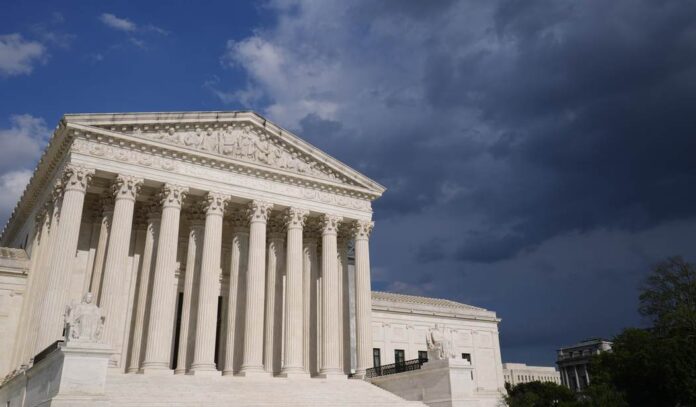We’re still a few weeks away from learning what the Supreme Court will do with the challenge to Maryland’s ban on so-called assault weapons, but the Court has accepted another case that could have major implications for our right to keep and bear arms. On Friday, SCOTUS granted cert to Smith & Wesson Brands, et al. v. Estados Unidos Mexicanos, accepting a request by gunmakers to decide whether Mexico’s $10 billion lawsuit against multiple gun makers can proceed or if it should be tossed out of court based on the Protection of Lawful Commerce in Arms Act.
The Mexican government (with the help of gun control veteran Jonathan Lowy) sued Smith & Wesson, Beretta, Century International Arms, Colt, Glock, and Interstate Arms alleging that the companies are aiding and abetting drug cartels in Mexico by manufacturing and selling guns like AR-15s, magazines that can hold more than ten rounds, and for refusing to adopt standards that go far beyond what U.S. law already requires for the production and sale of their products.
A U.S. District Court judge originally dismissed the case, but the First Circuit Court of Appeals reinstated the lawsuit earlier this year, ruling that Mexico’s lawsuit qualified for an exception to Protection of Lawful Commerce in Arms Act that authorizes suits alleging knowing violations of firearms laws that proximately cause a plaintiff’s injuries. As the gunmakers informed SCOTUS in their cert petition:
To fit within that exception, the First Circuit held that Mexico plausibly alleged America’s firearms companies have violated the federal law against aiding and abetting firearms trafficking—and that their regular business practices are the proximate cause of the many diffuse harms and costs that Mexico incurs from cartel violence.
In August, U.S. District Judge F. Dennis Saylor once again threw out the case against six of the seven gun makers sued by the Mexican government, ruling that the plaintiff has been “unable to muster sufficient proof to establish a sufficient relationship between the claimed injuries and the business transactions of any of the six defendants in Massachusetts.” Though Mexico’s government has appealed Saylor’s decision to the First Circuit, the Supreme Court’s decision to grant cert to the case could put an end to the lawsuit once and for all.
While SCOTUS has been reluctant to grant cert to Second Amendment-related cases before they’re fully decided on the merits by lower courts, the gun makers argued that the First Circuit’s decision to reinstate the lawsuit created a split between the First and Third Circuits; one that can only be resolved by the justices.
The courts on the other side of the split have it right. Applying long-settled principles of proximate cause, those courts have dismissed multiple suits raising similar claims filed by domestic governments.This suit is even more clearly foreclosed, as it was filed by a foreign government, resting on an even more attenuated causal chain, punctuated by multiple independent criminal acts, including third-party smuggling across an international border. The First Circuit’s contrary holding eviscerates PLCAA’s express statutory requirement of proximate cause. Indeed, if proximate cause tolerates this suit—which rests on an eight-step Rube Goldberg, starting with the lawful production and sale of firearms in the United States, and ending with the harms that drug cartels inflict on the Mexican government—then it is hard to imagine what it would not allow.
The firearms companies pointed out in the cert request that the Court held just last term that “aiding and abetting criminal activity must involve something more than making products generally available while knowing that criminals may misuse some of them downstream.”
But Mexico’s complaint alleges nothing more than that. It fails to identify any product, policy, or action by the American firearms industry that is deliberately designed to facilitate the unlawful activities of Mexican drug cartels. Instead,the theory of the complaint is that the defendants make firearms available knowing that some will be unlawfully smuggled abroad and put to criminal use, and that they could be doing more to stop the problem.
… The stakes of this case underscore why review is needed. Absent this Court’s intervention, Mexico’s multi-billion-dollar suit will hang over the American firearms industry for years, inflicting costly and intrusive discovery at the hands of a foreign sovereign that is trying to bully the industry into adopting a host of gun-control measures that have been repeatedly rejected by American voters. Worse, so long as the decision below remains good law, scores of similar suits are destined to follow from other governments, both foreign and domestic—all seeking to distract from their own political failings by laying the blame for criminal violence at the feet of the American firearms industry. Even if ultimately unsuccessful, the costs of that litigation will be devastating—not only for defendants, but more importantly for the millions of law-abiding Americans who rely on the firearms industry to effectively exercise their Second Amendment rights. This type of lawfare is exactly what Congress enacted PLCAA to avoid.
At bottom, this case reduces to a clash of national values: Mexico makes no secret that it abhors this country’s approach to firearms, and that it wants to use the American court system to impose domestic gun controls on the United States that the American people themselves would never accept through the ordinary political process. But even though that grievance is placed under the lettering of a complaint, and was filed on a docket, it has no basis in law. This Court’s review is badly needed.
And soon the gun makers will get it, hopefully putting an end to Mexico’s junk lawsuit against the U.S. firearms industry.
The cartel violence in Mexico has been enabled by the “hugs, not bullets” strategy of appeasing the drug cartels adopted by the Mexican government, which has allowed the cartels to become the de-facto government in some parts of the country. Andrés Manuel López Obrador, who was recently replaced as Mexico’s president by Claudia Sheinbaum, has repeatedly scapegoated U.S. gun makers and U.S. gun laws for cartel violence, while the Biden administration quietly dropped multiple investigations into Obrador’s own alleged ties to cartels.
While the Supreme Court can’t change the policies of the Mexican government, it now has the opportunity to at least curb Mexico’s attempt to litigate the Second Amendment out of existence, and today’s decision is good news for both the firearms industry and tens of millions of American gun owners.




